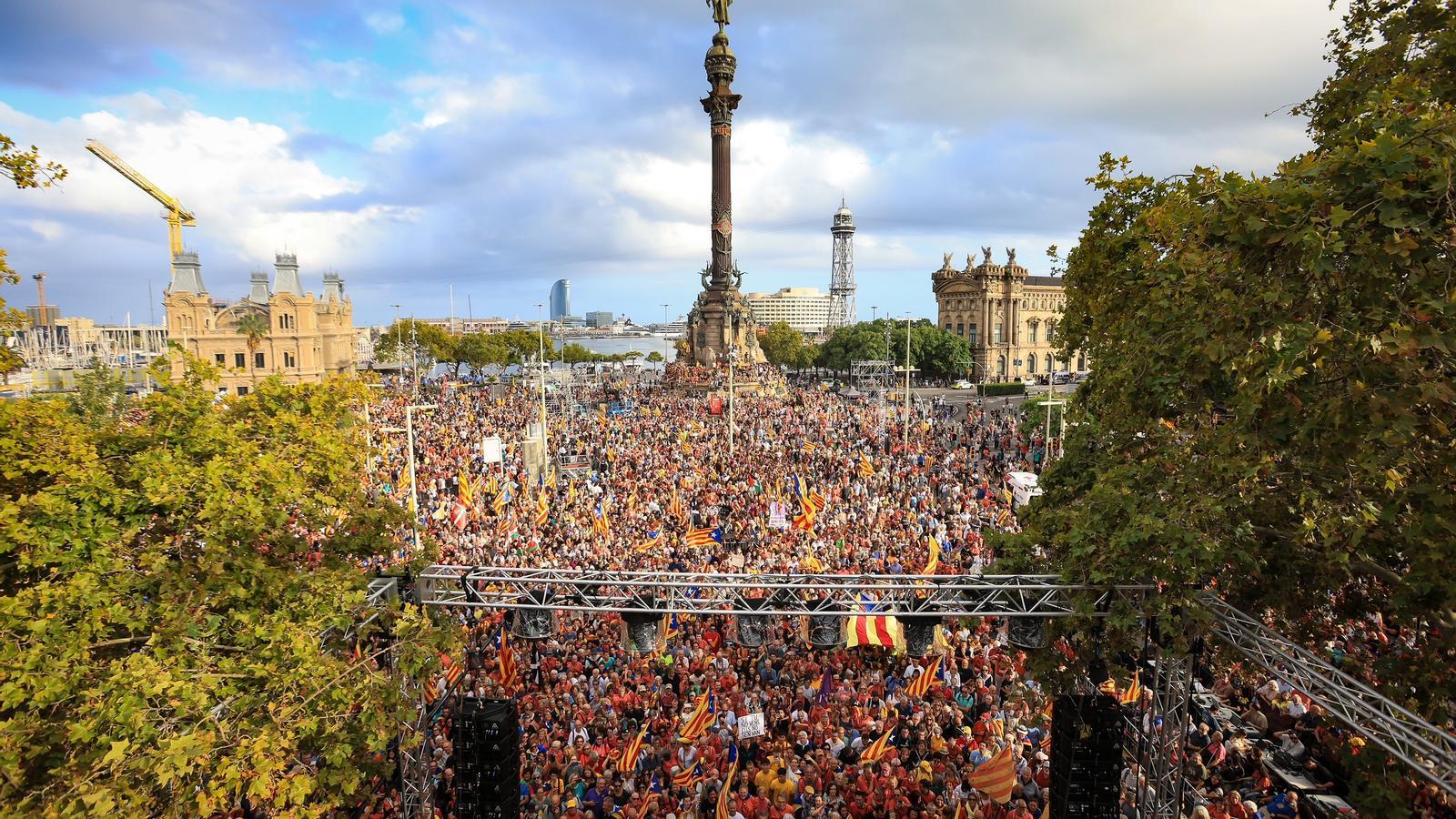

BarcelonaBefore I begin writing this chronicle, I'll plaster over all the analogies I've been pointing out throughout the day between the rain and the mood of the independence movement. Let it be known that so much rain has fallen and I've spent so much time sheltered under stalls of self-centered artisan cheeses and initiatives. I've had to face this Diada without an umbrella because, like so many others with whom I'll exchange angry, empathetic glances, I belong to a group of idiots who prefer to trust their cell phone screens rather than their eyes.
At nine in the morning, not a single drop has yet fallen on the floral offering at the Rafael Casanova monument, but halfway through, fabrics as representative of the country's diversity will be soaked, such as T-shirts from the Unión Deportiva Sant Andreu, blazers worn by political advisors, and white mantillas worn by the Foment girls. It's the kind of atmosphere where a tabloid reporter can ask a group of women wearing the Estelada as a cape if, if they were reborn, they would want to be Catalan again, and they not only answer yes, but are capable of developing it at length and are delighted with life. Jan Laporta has a queue of children waiting to take photos with him, while Laura Borràs is no longer the queen of selfies. We laypeople are far from the perimeter of the statue reserved for authorities, and only the music of a melodious orchestra reaches us. The song of the flag, which surprises me by tickling me with a patriotic resurgence. A young man shouts at Jaume Collboni—"Donkey! Espanyol!"—but, too far away and alone to initiate anything, he doesn't even try with Salvador Illa. It starts to rain as if... as if nothing had happened. I've already said that I'm going to treat precipitation as a strictly meteorological phenomenon and not as a metaphor.
The excuse of numbers
Naturally, the downpour feels awful, and at the same time, the veterans know it will be a perfect excuse to cover up the numbers of a grim Diada. Alongside the offering, at the Arc de Triomf, the Òmnium political event is being held, and concerts will follow in the evening. There are conflicting rumors about whether the storm will ease or worsen, but by midday it's pouring with rain, and Xavier Antich ends up giving his speech to a non-conference audience. Quimi Portet has a very beautiful song that goes like this: "If you dedicate a minimum of energy / to pure and simple reflection, / can you be anything other than extremist? / Can you avoid wanting to crush it all? Between that very Catalan thing of doing things against any circumstance and the raising of political awareness.
At the time of the demonstration the clouds scatter and a comfortable afternoon at the end of summer remains. Now I regret not looking for divine signs, but it's too late. My only job is to communicate to those who have not come this year that the demonstration is the one they have always known. Young and old, chavas and northwestern accents, enthusiasm for shouting as well as common sense to offer a good image. Surely there are fewer people, but there are so many that anyone who criticizes it would make people laugh, and being there ignites a communal joy that would repoliticize even the most psoeized. Local journalism versus controversy: the presence of Palestinian flags is negligible (there are more ikurriñes), and despite the more or less biased media coverage they will inevitably receive, from within the demonstration, the presence of the Catalan Alliance is practically irrelevant. With chants like "TV3, manipulator" and "Out with Spaniards and Muslims" (the latter disappears once the Mossos d'Esquadra allow them to join the demonstration), Sílvia Orriols's party manages to attract attention because they're a novelty, but the spectacle is more forced than worrying, and the whole thing ends with indifference and a lack of publicity.
The final speeches lack much energy, Lluís Llach is tired (last chance for analogies, which I'm missing), and when talking about language, everything is more convincing than when talking about politics. If last year everyone suffered through the first Diada without a pro-independence majority, now we can see that the emotional dynamics of the post-independence Diadas have consolidated: there's none of the fever of before October 1st, nor the internal tension of the years when the independence movement held the keys to Parliament without knowing what to do with them. Instead, there's a calm reserve of believers, and without a calm reserve of believers, there's still a country. This new normal leaves a very difficult-to-distinguish mix of grief and hope.
